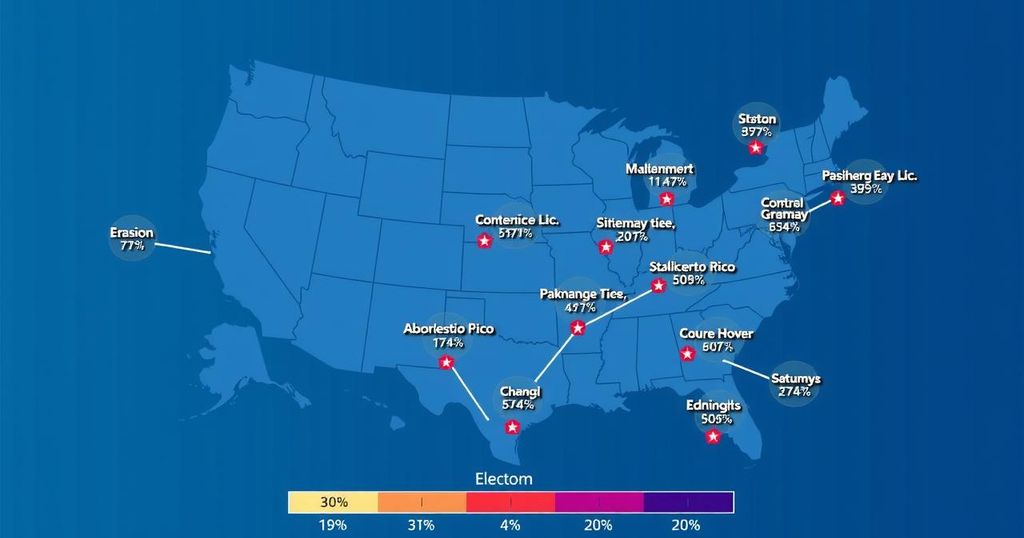As the U.S. election approaches, an offensive remark about Puerto Rico at a Trump rally has ignited backlash and may sway Puerto Rican voters against his campaign. With significant numbers of Puerto Ricans in swing states like Pennsylvania, this could affect electoral outcomes crucially. High-profile endorsements for the Harris-Walz campaign following the incident suggest a potential shift in voter sentiment.
As the U.S. election campaign enters its final week, it remains exceedingly competitive, with many analysts labeling it a toss-up. However, an unexpected incident at a rally could adversely affect Donald Trump’s campaign, creating what is known as an “October surprise.” This term generally refers to unforeseen events that can significantly influence an election’s outcome, often in a detrimental way for candidates. During his high-profile rally at Madison Square Garden in New York City on October 27, the opening speaker, comedian Tony Hinchcliffe, delivered remarks which many found offensive, calling Puerto Rico an “island of garbage.” This comment has incited a backlash from the Puerto Rican community and garnered criticism across the political landscape, leading to an increase in support for the Harris-Walz campaign. Given the timing of this incident, it raises concerns that Puerto Rican voters could form a crucial bloc capable of swaying the election. The ramifications of offending a significant minority group could be substantial. In the context of the electoral college, outcomes hinge upon votes from swing states such as Arizona, Georgia, Michigan, Nevada, North Carolina, Pennsylvania, and Wisconsin—where close margins were pivotal in past elections. For instance, in the 2020 election, Joe Biden won by an average margin of under 0.5% in these states. Puerto Rico, classified as an unincorporated U.S. territory, does not have electoral college votes. However, Puerto Ricans living in the mainland United States are eligible to vote in federal elections. Historically, this demographic tends to lean towards Democratic candidates, although their voter turnout has varied. With millions of Puerto Ricans residing on the mainland, their political preferences could shape the electoral outcome, particularly in battleground states. An analysis of the Puerto Rican population in key swing states highlights their potential electoral influence. In Pennsylvania, for instance, a significant number of Puerto Ricans exist, enough to affect crucial voting margins necessary for either major political party to secure its electoral votes. The Harris-Walz campaign’s targeting of Latino voters in Pennsylvania during Trump’s New York rally exemplifies this strategic awareness. The immediate fallout from Hinchcliffe’s comments has seen endorsements for Harris from high-profile figures such as Bad Bunny, Ricky Martin, and Jennifer Lopez, each of whom has vocally supported the Democrats. Their broad social media followings and substantial influence might enhance voter mobilization among Puerto Ricans, potentially tipping the election in favor of the Biden-Harris ticket.
The article discusses the significant political impact that remarks made by a comedian at a Trump rally could have on the electoral prospects of Donald Trump amid a closely contested election. It draws attention to the relationship between Puerto Rican voters, their historical allegiance to the Democratic Party, and the crucial swing states that could determine the election outcome. The text also highlights the unique status of Puerto Rico and the voting rights of its residents, emphasizing the potential swing influence of Puerto Ricans living on the U.S. mainland.
In summary, the offensive remarks directed towards Puerto Rico at a pivotal rally have sparked outrage and may mobilize Puerto Rican voters against the Trump campaign. As historical voting trends indicate a Democratic preference among Puerto Ricans, the implications of this incident could be considerable in swing states, particularly in Pennsylvania, where their numbers could decisively influence the election outcome. The increasing endorsements for the Harris-Walz campaign from prominent figures underscore the potential backlash against Trump’s rhetoric and its possible implications for the electoral college votes in battleground states.
Original Source: theconversation.com






